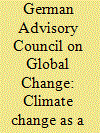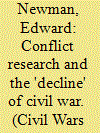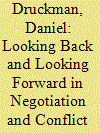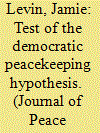|
|
|
Sort Order |
|
|
|
Items / Page
|
|
|
|
|
|
|
| Srl | Item |
| 1 |
ID:
091244


|
|
|
|
|
| Publication |
London, Earthscan, 2008.
|
| Description |
xviii, 248p.
|
| Standard Number |
9781844077618
|
|
|
|
|
|
|
|
|
|
|
|
Copies: C:1/I:0,R:0,Q:0
Circulation
| Accession# | Call# | Current Location | Status | Policy | Location |
| 054369 | 355.95160943/GER 054369 | Main | On Shelf | General | |
|
|
|
|
| 2 |
ID:
103119


|
|
|
|
|
| Publication |
2009.
|
| Summary/Abstract |
In recent years a number of scholars have suggested that there has been a decline in the absolute numbers of civil wars since the early 1990s, and this claim is purportedly supported by empirical evidence. This paper explores the methodological challenges which confront the study of conflict trends and identifies a number of problems with prevailing approaches. It argues that a differentiated approach to the concept of civil war is necessary before it is possible to make claims about trends in numbers of conflicts, because even the most sophisticated methodological processes have problems related to the manner in which they define and codify armed conflict. Nevertheless, the paper accepts that there has been a decline in the number of major civil wars, and it proposes - and evaluates - a number of explanations for the decline in such wars. These are: the decline of potent ideology since the end of the Cold War, which had hitherto ignited and/or exacerbated armed violence; the decline in intervention by third parties in civil war, a key feature of 'proxy' conflicts during the Cold War; the increasing tendency for secession - or hard partition - to be recognised by the international community, which has defused some ongoing conflicts; the increasingly interventionist nature of peacekeeping and peacebuilding activities by international organisations; the growing tendency for powerful states to view civil war and state failure as a potential security threat, resulting in a more substantial effort to resolve conflict which might have hitherto been regarded as 'merely' a humanitarian issue or even completely ignored; and the growing number of consolidated democracies.
|
|
|
|
|
|
|
|
|
|
|
|
|
|
|
|
| 3 |
ID:
172312


|
|
|
|
|
| Summary/Abstract |
In this article, I look back primarily at the research accomplishments made by my various collaborative teams to date and look forward toward the gaps that remain to be filled. Key insights and gaps are discussed on five research topics: group attachments and representation, turning points, social justice, values and interests, and conceptual learning. A concluding section highlights key discoveries that provide fertile ground for new research. Examples include the pulls and pushes of stakeholders, the role played by crises in producing turning points, connecting micro- to macro-level processes, the link between values and identities, and the thought processes that are encouraged by design activities. Further, advances in methodologies contribute to the next generation of studies on negotiation and conflict.
|
|
|
|
|
|
|
|
|
|
|
|
|
|
|
|
| 4 |
ID:
097068


|
|
|
|
|
| Publication |
2010.
|
| Summary/Abstract |
This paper employs bibliometric methods to map the structure of conflict research. Citation information is restructured by means of cluster and network analyses for the purpose of identifying the different discourses and fields contributing to conflict research. The data are derived from more than 1,300 articles published in 40 high-quality journals between 2000 and 2006. Four main discourses are identified within the field, and it is concluded that Democratic Peace Theory constitutes a powerful discursive core of contemporary conflict research, affecting most other discourses as well. It is suggested that instead of systemic foci, contemporary conflict research is dominated by the investigation of dyadic forms of interaction and that, somewhat surprisingly, the substantive focus of the most frequently cited research has remained on interstate war. The study intends to help researchers to be sensitive to gaps and focal points in contemporary research, and promote further discussion about the current state of the field. Applied approach provides academics, students, and practitioners with a usable and transparent procedure for structuring discourses and communicating about them further.
|
|
|
|
|
|
|
|
|
|
|
|
|
|
|
|
| 5 |
ID:
127188


|
|
|
|
|
| Publication |
2013.
|
| Summary/Abstract |
Professor Joseph Soeters shows admirable ambition in comparing national styles of conflict resolution and is extremely eager to draw historical lessons from such comparative exercises. However, he gets entangled in national mythmaking as he underestimates the complexity of comparative history of this kind. Particularly the establishment of true causal links between national (strategic) cultures and actual tactical behaviour on the ground is far more difficult than he suggests in his recent book chapter and his reply to my article in this journal.
|
|
|
|
|
|
|
|
|
|
|
|
|
|
|
|
| 6 |
ID:
178713


|
|
|
|
|
| Summary/Abstract |
While peacekeeping’s effects on receiving states have been studied at length, its effects on sending states have only begun to be explored. This article examines the effects of contributing peacekeepers abroad on democracy at home. Recent qualitative research has divergent findings: some find peacekeeping contributes to democratization among sending states, while others find peacekeeping entrenches illiberal or autocratic rule. To adjudicate, we build on recent quantitative work focused specifically on the incidence of coups. We ask whether sending peacekeepers abroad increases the risk of military intervention in politics at home. Drawing on selectorate theory, we expect the effect of peacekeeping on coup risk to vary by regime type. Peacekeeping brings with it new resources which can be distributed as private goods. In autocracies, often developing states where UN peacekeeping remuneration exceeds per-soldier costs, deployment produces a windfall for militaries. Emboldened by new resources, which can be distributed as private goods among the selectorate, and fearing the loss of them in the future, they may act to depose the incumbent regime. In contrast, peacekeeping will have little effect in developed democracies, which have high per-troop costs, comparatively large selectorates, and low ex-ante coup risk. Anocracies, which typically have growing selectorates, and may face distinctive international pressures to democratize, will likely experience reduced coup risk. We test these claims with data covering peacekeeping deployments, regime type, and coup risk since the end of the Cold War. Our findings confirm our theoretical expectations. These findings have implications both for how we understand the impact of participation in peacekeeping – particularly among those countries that contribute troops disproportionately in the post-Cold War era – and for the potential international determinants of domestic autocracy.
|
|
|
|
|
|
|
|
|
|
|
|
|
|
|
|
| 7 |
ID:
168599


|
|
|
|
|
| Summary/Abstract |
Increasingly, academic research in conflict-affected contexts relies on support from humanitarian organizations. Humanitarian organizations constitute sites of study in and of themselves; they partner with academics to roll out surveys or randomized program interventions; and they frequently facilitate security, logistics and transportation for independent researchers. We use a research partnership between IRC, the World Bank, and academic researchers in the UK, the US and eastern DR Congo, to explore the effects of humanitarian affiliation on conflict field research. In investigating when, how and under what conditions humanitarian identities are adopted by researchers (and how these affiliations shape research dynamics) we identify three paradoxes. First, “wearing humanitarian clothes” to facilitate research logistics can both facilitate and constrain access. Second, humanitarian affiliations invoked by researchers to ensure security and protection in volatile research sites can undermine the “insider” status of local staff. Finally, working through humanitarian organizations allows local and international researchers to benefit from the protections and privileges afforded to humanitarian employees without providing any of the services on which privileged access rests. In this article, we map out decisions faced by local and international researchers concerning when to adopt and discard humanitarian identities, and the fraught logistical, ethical and methodological consequences of these decisions.
|
|
|
|
|
|
|
|
|
|
|
|
|
|
|
|
|
|
|
|
|